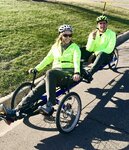ebikemom
Well-Known Member
The Special Olympics and related Unified Sports are organizations that work to bring people with and without intellectual and developmental disabilities into community to enjoy and develop their sport.
I am asking myself: What about EBIKING?
Ebiking has the potential to equip athletes with a skill useful in their daily lives for filling transportation needs. Some families, like mine, might take up ebiking so that they can ride together with their intellectually/developmentally disabled child or family member. Ebiking can also be enjoyed in a broader community, both to benefit those learning ebiking with their families and those who lack this opportunity.
Unlike other sports, ebiking has a life-long potential to enrich life both as a recreational activity AND as a practical daily life activity that enhances independence and access to functional activities such as shopping, attending appointments, and commuting to school and work, especially for persons who do not or cannot drive. Intellectual disabilities can mean that a person cannot qualify for a drivers license, and some people with disabilities such as autism experience other barriers to driving. Why wait for an ACCESS bus when you can just hop on your ebike and get places on your own timetable?
Like cross-country running, ebiking, once functional skills are established, happens on ordinary streets in the community. The following are potential ebiking activities for practice and riding sessions, as tailored to riders' levels and needs, for riders who already know how to ride a bike.
Ebikes make cycling accessible to people who lack the stamina for conventional cycling. Ebikes and cyclists can ride together, because ebikers can control their speed easily by choosing pedal assist levels (though ebikers may find they prefer to wait for conventional cyclists at the tops of hills, rather than going up hills at the slow pace taken by conventional cyclists. Waiting while cycling is also an important functional skill.)
How can we spread the power and joy of ebiking among people who can most benefit? I think that including ebiking as part of Special Olympics/Unified Sports can have a powerful developmental and transformational impact on people with intellectual and developmental disabilities.
I am asking myself: What about EBIKING?
Ebiking has the potential to equip athletes with a skill useful in their daily lives for filling transportation needs. Some families, like mine, might take up ebiking so that they can ride together with their intellectually/developmentally disabled child or family member. Ebiking can also be enjoyed in a broader community, both to benefit those learning ebiking with their families and those who lack this opportunity.
Unlike other sports, ebiking has a life-long potential to enrich life both as a recreational activity AND as a practical daily life activity that enhances independence and access to functional activities such as shopping, attending appointments, and commuting to school and work, especially for persons who do not or cannot drive. Intellectual disabilities can mean that a person cannot qualify for a drivers license, and some people with disabilities such as autism experience other barriers to driving. Why wait for an ACCESS bus when you can just hop on your ebike and get places on your own timetable?
Like cross-country running, ebiking, once functional skills are established, happens on ordinary streets in the community. The following are potential ebiking activities for practice and riding sessions, as tailored to riders' levels and needs, for riders who already know how to ride a bike.
- cycling skills practice such as using hand-signals and modified hand-signals, coming to a stop at different speeds, etc..
- basic bike maintenance, such as tire pumping, chain lubing, putting chain on after it falls off...
- riding on a practice route (for those who aren't ready for a variety of regular streets)
- recreational riding on local routes, departing from MIHS
Ebikes make cycling accessible to people who lack the stamina for conventional cycling. Ebikes and cyclists can ride together, because ebikers can control their speed easily by choosing pedal assist levels (though ebikers may find they prefer to wait for conventional cyclists at the tops of hills, rather than going up hills at the slow pace taken by conventional cyclists. Waiting while cycling is also an important functional skill.)
How can we spread the power and joy of ebiking among people who can most benefit? I think that including ebiking as part of Special Olympics/Unified Sports can have a powerful developmental and transformational impact on people with intellectual and developmental disabilities.
